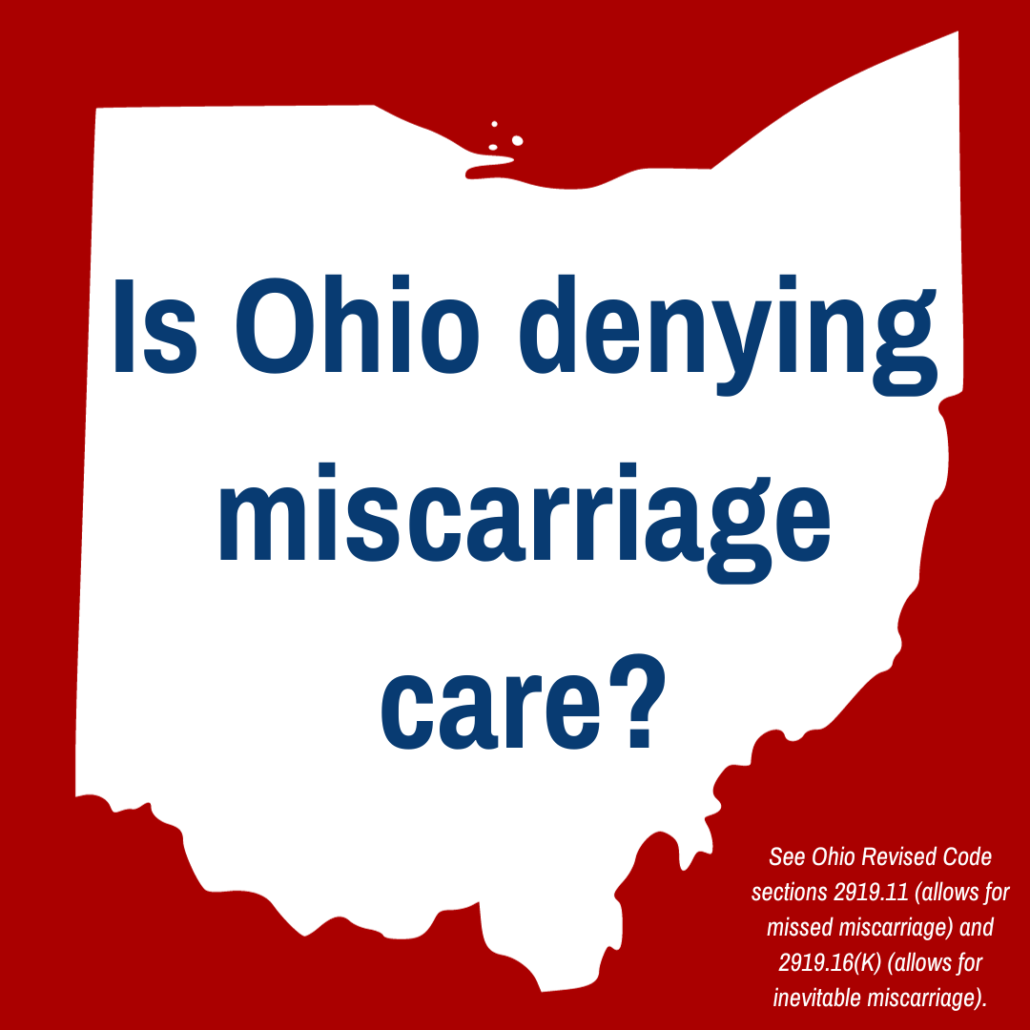Is Ohio denying miscarriage care?

In late 2022, NPR published Her miscarriage left her bleeding profusely. An Ohio ER sent her home to wait. This is the story of Christina Zielke and her struggle to get appropriate miscarriage treatment while in Ohio. Abortion rights advocates are pointing to this story as evidence of the harm of abortion bans in general and specifically in Ohio.
The story, and ones like it, are important for the nation and for particularly Ohio as the state considers whether to support Issue 1, an amendment which would enshrine very broad (potentially unlimited) abortion access into the Ohio constitution. The NPR story raises the question: what’s going on in Ohio?
[Read more – Ohio Newspapers refuse to endorse Issue 1]
Ohio abortion laws explicitly allow for miscarriage care.
Before we dig into the NPR story itself, let’s take a moment and examine whether Ohio’s abortion laws restrict miscarriage care. Ohio Revised Code section 2919.11 defines abortion (emphasis added):
“Abortion” means the purposeful termination of a human pregnancy by any person, including the pregnant woman herself, with an intention other than to produce a live birth or to remove a dead fetus or embryo.
Ohio Revised Code Section 2919.11
This language is important because there are different kinds of miscarriages. One of them is a “missed miscarriage,” where the embryo or fetus dies but the woman’s body does not pass the remains naturally. This may require some kind of intervention to remove the remains. Under Ohio law any kind of intervention to remove the remains, even if it’s identical to interventions for abortion, is not legally an abortion, and is absolutely allowed.
Missed miscarriages are not the only kind of miscarriage. Another important kind is called “inevitable miscarriage,” sometimes called “inevitable abortion.” Inevitable miscarriage is when a woman has vaginal bleeding and dilation and there is a strong likelihood of miscarriage (the miscarriage is, or is very likely to be, inevitable). An inevitable miscarriage does not necessarily mean the embryo’s or fetus’s heart has stopped, but the conditions present make it unlikely that the pregnancy will continue.
According to Ohio Revised Code section 2919.16(K), even if there is a detectable fetal heartbeat, Ohio law very specifically allows for medical intervention in the event of an inevitable miscarriage (emphasis added):
A medically diagnosed condition that constitutes a “serious risk of the substantial and irreversible impairment of a major bodily function” includes pre-eclampsia, inevitable abortion, and premature rupture of the membranes…
Ohio Revised Code Section 2919.16(K)
So if Ohio abortion laws explicitly allow for treatment of missed or inevitable miscarriages, why does NPR have a story of Zielke not receiving appropriate miscarriage care in Ohio?
Doctors have multiple reasons to refrain from intervening too soon in miscarriages.
As NPR reports, Zielke lives in Washington DC and was first seen for miscarriage there. Her DC practitioner recommended that Zielke wait and see if she passed the remains on her own.
A doctor from her Ob-Gyn’s office called her to confirm that the pregnancy had ended in a miscarriage. They laid out her options: Take medication to make the pregnancy tissue come out faster, have a dilation and curettage or D&C procedure to remove the pregnancy tissue from her uterus, or wait for it to come out on its own. The doctor suggested she wait.
Selena Simmons-Duffin, NPR
This is not an unusual medical recommendation for women miscarrying. There are multiple reasons that a doctor might not want to intervene. For example, sometimes it appears that a woman is miscarrying and then it turns out that she does not, and she is able to proceed with the pregnancy and a successful live birth. If a medical team intervenes too early in (an apparent) miscarriage of a wanted pregnancy, they risk ending the life of an embryo or fetus who otherwise would have lived.
Even if the medical team is highly confident the woman has miscarried or is having an inevitable miscarriage, they might want to let her pass the remains on her own because they think that that is safer and better for her body. Interventions have their own risks, and ought to be medically indicated.
That is likely why Zielke’s OB in Washington DC, a place with no limits at all on abortion, still declined to intervene and instead recommended that she wait and see if she passes the remains naturally. Doctors recommend this all the time. And because miscarriage is so misunderstood by society, many people don’t understand that this process can take weeks, and that’s not abnormal. Remember that fact when you hear stories of women saying they had a miscarriage, were refused treatment, and had to carry their dead child for weeks. It’s not that they have to be septic before they can get treatment. It’s that treatment may not be medically necessary or justified if the doctor thinks there are reasonable odds of the woman completing the miscarriage without intervention.
Carrying a miscarried or miscarrying child for weeks sounds incredibly traumatic. I wouldn’t wish that situation on anyone. But the situation is not specific to anti-abortion states or to states after Dobbs; it’s a common recommendation from medical providers to women going through miscarriage.
The NPR article provides no evidence that hospital staff were concerned about abortion laws.
NPR continues by explaining Zielke and her husband visited Ohio, and while there Zielke starts bleeding–a lot–weeks after the doctor in DC told her to wait. She goes to an Ohio emergency room where staff examine her and say that there’s nothing to be too concerned about at this stage.
To check how much blood she had lost, they measured her hemoglobin level – Zielke says they told her she hadn’t lost enough for it to be of concern yet.
Selena Simmons-Duffin, NPR
Again, such a situation is not uncommon. The staff discharge Zielke and she and her husband interpret this decision as possibly having to do with Ohio’s abortion laws. But there’s no indication that’s the case.
In fact the article mentions staff at the Ohio hospital told Zielke that the hospital sometimes performs D&Cs to stop heavy bleeding.
One nurse mentioned in passing that a D&C is sometimes needed to get heavy bleeding to stop.
Selena Simmons-Duffin, NPR
The ER staff clearly weren’t afraid of the possibility of a D&C; they were the ones who brought it up.
Still, the ER staff send Zielke on her way. Shortly after, she nearly passes out because she starts to lose too much blood too quickly. Paramedics take her back to the same ER, and they perform a D&C.
When the whole ordeal is over, Zielke files complaints with the Ohio hospital and with the OBGYN practice in Washington DC. This is an interesting juxtaposition because nowhere in the article (or anywhere else in these conversations) does anyone wonder why there were mistakes made at the Washington DC practice, where they didn’t fully inform Zielke of what was going on, what to expect, or what future risks might be. Nobody speculates that the DC OB’s errors were due to fear of anti-abortion laws, because there are no anti-abortion laws there. Washington DC doesn’t even have gestational limits on abortion.
But if we can understand that medical practitioners in pro-choice states make mistakes, then we should be able to recognize that there will also be mistakes made in places with anti-abortion laws. That doesn’t mean the anti-abortion laws forced those mistakes.
Important to note, too, that in most of these stories (maybe all of these stories) we don’t get to hear the perspective of the medical professionals that were directly involved in the patient’s care because of patient confidentiality. The NPR story is no different.
University Hospitals, which runs TriPoint Medical Center, declined a request for an interview about Zielke’s care, citing patient privacy.
Selena Simmons-Duffin, NPR
They can’t correct the record and explain any missing information or misunderstandings that would give them medical reason to make the decisions they made.
It is extremely common for patients to not fully understand medical recommendations and treatment, either because they don’t have the education or because their providers are not great at explaining their decisions and rationales. But poor communication doesn’t mean the providers lack good medical reasons for their decisions; it could just mean that their communication sucks. The NPR article itself demonstrates this phenomenon when describing the Washington DC OB who Zielke ended up filing a complaint against.
We usually don’t get to learn the full picture of what happens in these stories because the medical professionals best positioned to clarify aren’t allowed to.
If Ohio laws had a chilling effect on miscarriage care, there would be far more examples.
Another way to think about this is to do some basic math. Ohio in 2021 had something like 130,000 live births and if we consider unintended pregnancy rates, abortion rates, and the percent of confirmed pregnancies which miscarry, a back-of-the-envelope calculation suggests there should be somewhere between perhaps 10,000 and 20,000 miscarriages in Ohio each year.
If it were really the case that medical providers are too afraid to treat miscarriage, we would be hearing endless stories of women almost dying because they couldn’t get appropriate treatment. Instead, we find very few such cases, and often the details are ambiguous and not at all clear that the problems are because of abortion laws.
It’s unlikely that there’s a problem with access to clearly legal miscarriage care; it is a huge stretch to use that concern as an argument against any and all restrictions on elective abortion.
[Read more – Ways you can fight abortion extremism in Ohio]



